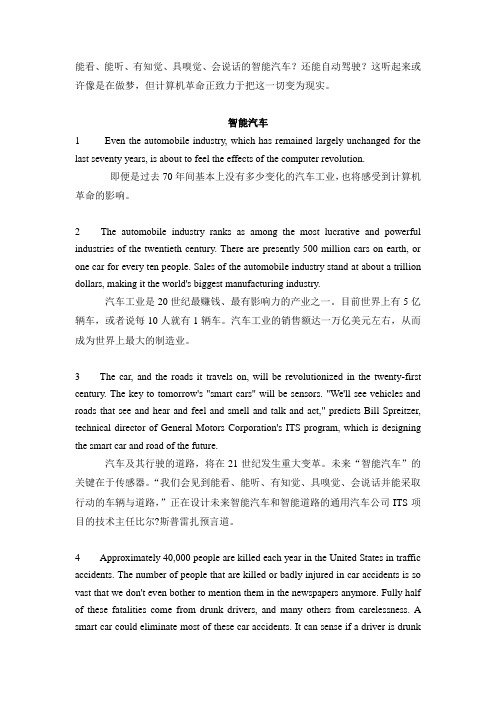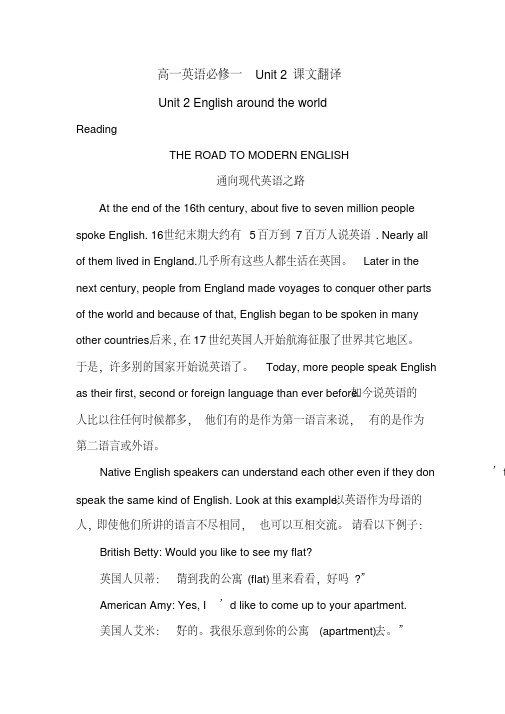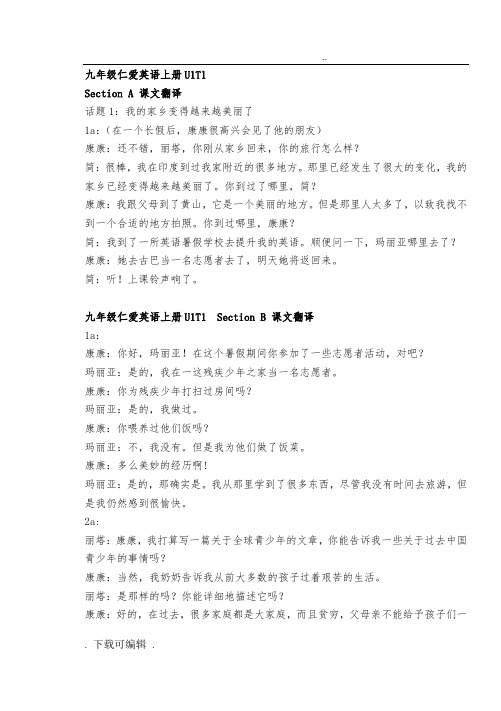unit 2 课文翻译(1)
Unit 2 课文翻译

能看、能听、有知觉、具嗅觉、会说话的智能汽车?还能自动驾驶?这听起来或许像是在做梦,但计算机革命正致力于把这一切变为现实。
智能汽车1 Even the automobile industry, which has remained largely unchanged for the last seventy years, is about to feel the effects of the computer revolution.即便是过去70年间基本上没有多少变化的汽车工业,也将感受到计算机革命的影响。
2 The automobile industry ranks as among the most lucrative and powerful industries of the twentieth century. There are presently 500 million cars on earth, or one car for every ten people. Sales of the automobile industry stand at about a trillion dollars, making it the world's biggest manufacturing industry.汽车工业是20世纪最赚钱、最有影响力的产业之一。
目前世界上有5亿辆车,或者说每10人就有1辆车。
汽车工业的销售额达一万亿美元左右,从而成为世界上最大的制造业。
3 The car, and the roads it travels on, will be revolutionized in the twenty-first century. The key to tomorrow's "smart cars" will be sensors. "We'll see vehicles and roads that see and hear and feel and smell and talk and act," predicts Bill Spreitzer, technical director of General Motors Corporation's ITS program, which is designing the smart car and road of the future.汽车及其行驶的道路,将在21世纪发生重大变革。
高一英语必修一Unit2课文翻译

高一英语必修一Unit 2课文翻译Unit 2 English around the worldReadingTHE ROAD TO MODERN ENGLISH通向现代英语之路At the end of the 16th century, about five to seven million peoplespoke English. 16世纪末期大约有5百万到7百万人说英语. Nearly allof them lived in England.几乎所有这些人都生活在英国。
Later in thenext century, people from England made voyages to conquer other partsof the world and because of that, English began to be spoken in manyother countries.后来,在17世纪英国人开始航海征服了世界其它地区。
于是,许多别的国家开始说英语了。
Today, more people speak Englishas their first, second or foreign language than ever before.如今说英语的人比以往任何时候都多,他们有的是作为第一语言来说,有的是作为第二语言或外语。
Native English speakers can understand each other even if they don’t speak the same kind of English. Look at this example:以英语作为母语的人,即使他们所讲的语言不尽相同,也可以互相交流。
请看以下例子:British Betty: Would you like to see my flat?英国人贝蒂:“请到我的公寓(flat)里来看看,好吗?”American Amy: Yes, I’d like to come up to your apartment.美国人艾米:“好的。
2020新上教版高中英语必修三unit2课文原文及翻译(英汉对照)

上教版必修三Unit2The things around us Reading AThe story of a T-shirtLagos,Nigeria—Yaba market is busy,hot and dusty.People are looking around the second-hand shops,picking through piles of old clothes,and they’re all searching for deals.The market is flooded with cheap clothes from America and Europe,ad they usually sell out fairly quickly.“These clothes make people’s dreams come true,”says Abeke,a shop owner.“Everyone wears them.When they put them on,you can’t tell the difference between the rich and the poor.”At the front of Abeke’s store is a cotton T-shirt with the words“Get Real”.It’s picked up by a young guy who looks at it carefully.He tries it on and smiles—it fits him and it looks good.It’s a simple T-shirt,but it has a long story.A few years ago,the T-shirt started life in a cotton field in Uzbekistan.The cotton was watered every day and harmful chemicals were used to kill insects in the field.As the cotton grew,a young woman called Feruza picked it.She sweated in the field for ten to twelve hours every day in temperatures of over30℃,but she was paid very little.Sometimes the chemicals hurt her eyes.Next,the cotton was flown to India.The T-shirt was made in a tiny factory in the Indian port city of Mumbai.There were20adults in it,five children and no air conditioning.The adults made the T-shirts and the children checked them.The finished T-shirt was sent to a huge discount shop in the UK.The people who shopped there didn’t know where the clothes came from.They didn’t want to spend a lot of money,but they wanted to look good.The T-shirt was cheap and it was bought by15-year-old Ryan who liked the words on it.It was washed,worn and ironed and,after a few months,Ryan threw it away.His mum took it to a charity shop with some other old clothes,which were sold to an export company.A few weeks later,the T-shirt made its way to Yaba market in Nigeria.Back at the market,the young man takes off the T-shirt and looks at the$3price tag.He hesitates for a moment and then he offers Abeke$1.50because that’s all the cash he’s got.Abeke shakes her hand.As she hangs up the T-shirt at the front of the shop,the charity shop’s price tag is still on the back:25p.The journey of a T-shirt tells many stories.Stories about people,countries and cultures.Storiesabout farmers and factory workers.Stories about shopping centres.But for most of all,it’s a story about choices,and our choices can make a difference.Do you really need another T-shirt?Do you care where it’s from?What’s the cost to the environment?What’s the cost to the environment? What’s the human cost?Think about it,because our choices could start a new story.Did you know?·Ten thousand litres of water are used to make one T-shirt.·A200-gram T-shirt can use up to5tonnes of resources.·3.4billion T-shirts are sold in the USA every year.·Children as young as seven work in cotton fields and factories.一个T恤的故事尼日利亚拉各斯的yaba市场非常繁忙、炎热、尘土飞扬。
牛津译林版新教材高中英语必修二unit2课文原文及翻译(含单词表)

2020牛津译林版高中英语高一必修二unit2 课文及翻译A beginner’s guide to exercise体育锻炼入门You want to start doing exercise? Congratulations! You have just taken your first step towards a new and improved you!想开始锻炼身体了吗?祝贺你!你已经向新的、更好的自己跨出了第一步。
Understanding the benefits of exercise了解锻炼的益处Most people assume that regular exercise does wonders for the body and mind-but what exactly are its health benefits? To start with, physical activity increases the efficiency of your heart and lungs. During exercise, your heart and lungs must work harder. This extra effort makes them grow stronger over the long term. It has also been proven that active people tend to have better immune systems and are at lower risk of diseases. Moreover,exercise is good for your mental health. Working out can help you reduce stress and get over negative feelings. Some studies even show that exercise improves certain brain functions, meaning you could actually exercise your way to better performance at school!大多数人都认为经常锻炼对身心大有益处——不过,锻炼究竟对健康有哪些好处呢?首先,体育活动能增强心肺功能。
大学英语教材第一册unit2课文翻译

大学英语教材第一册unit2课文翻译Unit 2: Lesson Text Translation本单元的课文翻译内容旨在帮助大家理解和掌握大学英语教材第一册中的第二个单元,下面是课文翻译内容。
课文:空中交通网络全球化的发展使得航空旅行成为现代人和商务人士常用的出行方式。
但与此同时,空中交通也面临着日益增长的挑战,如航空器通信、导航和监视技术的不断革新,也使得对空中交通员的要求越来越高。
为了更好地管理和控制空中交通,一种空中交通管理系统被广泛采用。
这个系统通过使用雷达和通信设备来监视所有在空中的航空器,确保它们在空中航行时相互保持安全距离。
随着技术的发展和需求的增长,传统的雷达系统已经无法满足当今空中交通的需要。
因此,许多国家开始采用卫星技术来监视航空器的位置和动态,这就是卫星导航系统的应用。
卫星导航系统可以通过更准确和可靠的方式来确定航空器的位置,同时提供实时的飞行信息。
与此同时,通信技术的进步也为空中交通管理带来了巨大的改变。
随着引进数字通信技术,通信的质量和效率得到了极大的提高,因此使得空中交通员之间的协作变得更加紧密。
无线电通信是航空器间和航空器与地面之间进行联系和信息交流的常用方式。
除了技术的改进,空中交通员的培训和能力也是保障航空安全的重要环节。
他们需要经过专业的培训,掌握飞行规则、导航技术和通信流程等知识。
他们还需要进行持续的培训和考核,以保持良好的技能水平。
总之,空中交通网络是现代航空业不可或缺的一部分。
通过各种先进的技术和体系,这个网络能够保证航空器在飞行中的安全和高效。
同时,空中交通员的能力和专业素养也起着举足轻重的作用。
只有通过持续的培训和提升,空中交通员才能保持良好的状态,为航空安全做出重要贡献。
以上是本单元课文翻译的内容,希望对大家学习英语有所帮助。
谢谢!。
仁爱英语九年级(上册)课文互译Unit1_2

九年级仁爱英语上册U1T1Section A 课文翻译话题1:我的家乡变得越来越美丽了1a:(在一个长假后,康康很高兴会见了他的朋友)康康:还不错,丽塔,你刚从家乡回来,你的旅行怎么样?简:很棒,我在印度到过我家附近的很多地方。
那里已经发生了很大的变化,我的家乡已经变得越来越美丽了。
你到过了哪里,简?康康:我跟父母到了黄山,它是一个美丽的地方。
但是那里人太多了,以致我找不到一个合适的地方拍照。
你到过哪里,康康?简:我到了一所英语暑假学校去提升我的英语。
顺便问一下,玛丽亚哪里去了?康康:她去古巴当一名志愿者去了,明天她将返回来。
简:听!上课铃声响了。
九年级仁爱英语上册U1T1 Section B 课文翻译1a:康康:你好,玛丽亚!在这个暑假期间你参加了一些志愿者活动,对吧?玛丽亚:是的,我在一这残疾少年之家当一名志愿者。
康康:你为残疾少年打扫过房间吗?玛丽亚:是的,我做过。
康康:你喂养过他们饭吗?玛丽亚:不,我没有。
但是我为他们做了饭菜。
康康:多么美妙的经历啊!玛丽亚:是的,那确实是。
我从那里学到了很多东西,尽管我没有时间去旅游,但是我仍然感到很愉快。
2a:丽塔:康康,我打算写一篇关于全球青少年的文章,你能告诉我一些关于过去中国青少年的事情吗?康康:当然,我奶奶告诉我从前大多数的孩子过着艰苦的生活。
丽塔:是那样的吗?你能详细地描述它吗?康康:好的,在过去,很多家庭都是大家庭,而且贫穷,父母亲不能给予孩子们一. 下载可编辑.个教育。
丽塔:哦,那么大多数孩子们是怎样度过他们的童年的?康康:为了帮助供养他们的家庭,他们不得不去当童工,他们整天整夜地工作,从来没有饱食过。
丽塔:如今青少年怎么样呢?康康:现在我们的国家迅速地发展了,政府给贫困家庭以支持,所以孩子们能够得到良好的教育。
丽塔:哦,他们是幸运的。
九年级仁爱英语上册U1T1 Section C课文翻译1a :我的关于北京的报告大家好!我是康康。
我的奶奶生活在北京40多年了,她亲自见证了北京的变化。
外研版-八年级全册Unit2-英语课文-翻译

Module 2 Friendship Unit 2 No one knew who I was.1. 当我十三岁的时候,一个男孩给了我一件重要的礼物。
2. 那是一个微笑。
3. 在初中的第一个学期的早秋,我的旧学校离我远了。
4. 结果,没有人知道我是谁。
5. 我非常孤独,害怕和任何人交朋友。
6. 每次我听到其他同学在讨论和笑的时候,我感到心碎了。
7. 我不能和任何人说我的问题,我不想我的父母担心我。
8. 一天,我的同学和他们的朋友很开心的讨论着,但是,我像往常一样不开心地坐在椅子上。
9. 在这时,一个男孩进入了教室。
10. 我不知道他是谁。
11. 他路过我然后返回。
12. 他看着我,没有任何语言,微笑。
13. 突然,我感到一些东西变得明亮而友好。
14. 它使我感到高兴,活泼,和温暖。
15. 那个微笑改变了我的生活。
16. 我开始去和其他同学说话和交朋友。
17. 一天天的,我变的和其他同学更亲近了。
18. 那个带着幸运微笑的男孩现在成为了我最好的朋友。
19. 一天,我问他为什么对我笑,但是,他不记得对我笑过。
20. 没关系因为所有的黑暗日子都过去了。
21. 现在我相信这个世界是和你想的一样的。
22. 如果你认为你是孤独的,你也许总会感到孤独。
23. 所以,对全世界微笑,而且它也会冲你微笑。
Module 3 On the radio Unit 2 I remember sitting close to the radio1. “你多大了?”这个WXBN的经理俯视我问到。
2. “十五岁。
”我说。
3. “你想要一个在电台的工作吗?你不是应该在学校吗?”他问到。
4. 我能怎么解释呢?5. 我一直非常喜欢广播。
6. 当我四、五岁的时候,我记得坐在客厅的收音机旁,听我最喜欢的节目,听我最喜欢的主持人的声音。
7. 这感觉像是他们在和我单独进行谈话。
8. 在九岁的时候,我在一家小电台找到了一份工作。
9. 随着年龄的增长,我对播音的兴趣也在增长。
Unit2课文翻译

Unit2课文翻译Unit 2 Beat your Fear课文ASwimming through fear游越恐惧1. 当时我和朋友正在法国旅行,我们把汽车停在海滩,眼前就是地中海。
巨浪翻滚击打着构筑起防波堤的偌大岩石。
人们说这里的海滩以其可怕的裂流而著称。
恐惧让我不寒而栗。
没有什么比水让我更害怕了。
2. 只是看到了海就已经让我觉得反胃。
3. 我曾经一直都是喜欢水的,并且直到去年夏天我都还是一名游泳好手。
那时,我决定爬上游泳池边上最高的跳板来跳水。
我从那么高的地方跳下,重重地撞击到水面上。
我肺里的空气一下子全被挤出去了,马上不省人事。
醒来时发现哥哥正把我虚弱的身体从游泳池里拖出来。
从那时起,我对水的恐惧就没有消退过,我怕极了水。
4.“贾森,你要过来吗?”我的朋友马特朝我喊道。
5.我说:“好,就是欣赏一下景色”,又在心里默默加了一句——在岸上欣赏。
担心如果他们知道我害怕水而可怜我。
6. 突然,我听到有人用法语喊叫。
接着看见一群人没脱衣服,就冲到海里。
我心想,这真是太奇怪了。
7. 我瞥见防波堤尽头的海浪中有个东西在上下浮动。
我惊恐地意识到大事不妙,倒吸了一口凉气,那居然是个小男孩!前去救落水男童的人们搏击着海浪,但情况却不乐观。
由于水的拉拽,他们根本不可能及时游到小男孩身边。
8. 我扭头看看那小男孩。
他的头刚露出水面,然后一个浪头打过来,好一阵不见踪影——我不得不做点什么了。
9. 我估计了当下的情形后注意到了——对,那防波堤!小男孩靠近那个地方,也许我可以从那儿帮忙。
我冲下海滩,跑上防波堤,但突然我想起了什么——水!顿时有了恐惧的症状:我手心冒汗,胃里感觉不适。
我一下子停下来。
10. 水里的那些人低估了海浪的威力,救援工作没有任何进展。
只有我注意到了跑到防波堤上是到达溺水男童的最快的路径。
然而在此性命攸关之际,我极度恐慌。
我努力去回想十几岁时所接受的救生员训练。
11. 我因恐惧而全身瘫软,但我强迫自己向前移动,展开这场突发的救援行动。
- 1、下载文档前请自行甄别文档内容的完整性,平台不提供额外的编辑、内容补充、找答案等附加服务。
- 2、"仅部分预览"的文档,不可在线预览部分如存在完整性等问题,可反馈申请退款(可完整预览的文档不适用该条件!)。
- 3、如文档侵犯您的权益,请联系客服反馈,我们会尽快为您处理(人工客服工作时间:9:00-18:30)。
Smart cars that can see, hear, feel, smell, and talk? And drive on their own? This may sound like a dream, but the computer revolution is set to turn it into a reality.能看、能听、有知觉、具嗅觉、会说话的智能汽车?还能自动驾驶?这听起来或许像是在做梦,但计算机革命正致力于把这一切变为现实。
Smart Cars智能汽车Michio Kaku米其奥•卡库1 Even the automobile industry, which has remained largely unchanged for the last seventy years, is about to feel the effects of the computer revolution.即便是过去70年间基本上没有多少变化的汽车工业,也将感受到计算机革命的影响。
2 The automobile industry ranks as among the most lucrative and powerful industries of the twentieth century. There are presently 500 million cars on earth, or one car for every ten people. Sales of the automobile industry stand at about a trillion dollars, making it the world's biggest manufacturing industry.汽车工业是20世纪最赚钱、最有影响力的产业之一。
目前世界上有5亿辆车,或者说每10人就有1辆车。
汽车工业的销售额达一万亿美元左右,从而成为世界上最大的制造业。
3 The car, and the roads it travels on, will be revolutionized in the twenty-first century. The key to tomorrow's "smart cars" will be sensors. "We'll see vehicles and roads that see and hear and feel and smell and talk and act," predicts Bill Spreitzer, technical director of General Motors Corporation's ITS program, which is designing the smart car and road of the future.汽车及其行驶的道路,将在21世纪发生重大变革。
未来“智能汽车”的关键在于传感器。
“我们会见到能看、能听、有知觉、具嗅觉、会说话并能采取行动的车辆与道路,”正在设计未来智能汽车和智能道路的通用汽车公司ITS项目的技术主任比尔•斯普雷扎预言道。
4 Approximately 40,000 people are killed each year in the United States in traffic accidents. The number of people that are killed or badly injured in car accidents is so vast that we don't even bother to mention them in the newspapers anymore. Fully half of these fatalities come from drunk drivers, and many others from carelessness. A smart car could eliminate most of these car accidents. It can sense if a driver is drunk via electronic sensors that can pick up alcohol vapor in the air, and refuse to start up the engine. The car could also alert the police and provide its precise location if it is stolen.美国每年有大约4万人死于交通事故。
在汽车事故中死亡或严重受伤的人数太多,我们已经不屑在报纸上提及。
这些死亡的人中至少有半数是酒后开车者造成的,另有许多死亡事故是驾驶员不小心所导致。
智能汽车能消除绝大多数这类汽车事故。
它能通过会感测空气中的酒精雾气的电子传感器检测开车者是否喝醉酒,并拒绝启动引擎。
这种车还能在遇窃后通报警方,告知车辆的确切地点。
5 Smart cars have already been built which can monitor one's driving and the driving conditions nearby. Small radars hidden in the bumpers can scan for nearby cars. Should you make a serious driving mistake (e.g., change lanes when there is a car in your "blind spot") the computer would sound an immediate warning.能监控行车过程以及周围行车状况的智能汽车已经建造出来。
藏在保险杠里的微型雷达能对周围的汽车作扫描。
如果你发生重大行车失误(如变道时有车辆你“盲点”内),计算机立即会发出警报。
6 At the MIT Media Lab, a prototype is already being built which will determine how sleepy you are as you drive, which is especially important for long-distance truck drivers. The monotonous, almost hypnotic process of staring at the center divider for long hours is a grossly underestimated, life-threatening hazard. To eliminate this, a tiny camera hidden in the dashboard can be trained on a driver's face and eyes. If the driver's eyelids close for a certain length of time and his or her driving becomes erratic, a computer in the dashboard could alert the driver.在麻省理工学院媒介实验室,业已制造出能测知你行车时有多少睡意的样车,这对长途卡车司机意义尤其重要。
一连数小时注视着中夹分道线这样一个单调、几乎能催眠的过程是被严重低估的威胁生命的重大隐患。
为消除这一隐患,藏在仪表板里的一架微型相机可对准开车者的脸部及眼睛。
如果司机的眼帘合上一定时间,行车变得不稳,仪表板里的计算机就会向司机发出警报。
7 Two of the most frustrating things about driving a car are getting lost and getting stuck in traffic. While the computer revolution is unlikely to cure these problems, it will have a positive impact. Sensors in your car tuned to radio signals from orbiting satellites can locate your car precisely at any moment and warn of traffic jams. We already have twenty-four Navstar satellites orbiting the earth, making up what is called the Global Positioning System. They make it possible to determine your location on the earth to within about a hundred feet. At any given time, there are several GPS satellites orbiting overhead at a distance of about 11,000 miles. Each satellite contains four "atomic clocks," which vibrate at a precise frequency, according to the laws of the quantum theory.开车最头疼的两大麻烦是迷路和交通堵塞。
虽然计算机革命不可能彻底解决这两个问题,但却会带来积极的影响。
你汽车上与绕轨道运行的卫星发出的无线电信号调谐的传感器能随时精确地确定你汽车的方位,并告知交通阻塞情况。
我们已经有24颗环绕地球运行的导航卫星,组成了人们所说的全球卫星定位系统。
通过这些卫星我们有可能以小于100英尺的误差确定你在地球上的方位。
在任何一个特定时间,总有若干颗全球定位系统的卫星在11000英里的高空绕地球运行。
每颗卫星都装有4个“原子钟”,它们根据量子理论法则,以精确的频率振动。
8 As a satellite passes overhead, it sends out a radio signal that can be detected by a receiver in a car's computer. The car's computer can then calculate how far the satellite is by measuring how long it took for the signal to arrive. Since the speed of light is well known, any delay in receiving the satellite's signal can be converted into a distance.卫星从高空经过时发出能被汽车上计算机里的接收器辨认的无线电信号。
